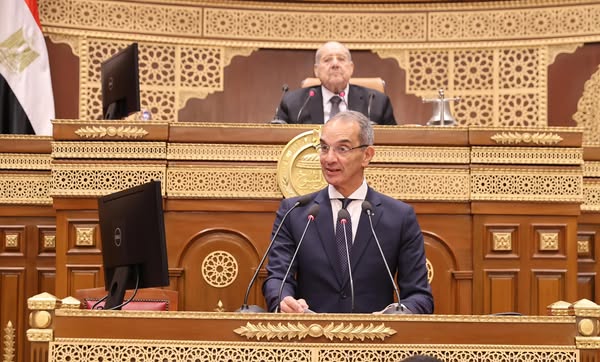The Minister of Communications and Information Technology Amr Talaat has delivered a speech at a Senate plenary session. It was chaired by President of the Senate Abdel-Wahab Abdel-Razeq and attended by Minister of Parliamentary and Legal Affairs and Political Communication Mahmoud Fawzy.
In his remarks, the ICT Minister emphasized that cybersecurity is a shared responsibility extending beyond any specific entity. It involves individuals and institutions across society and demands concerted efforts to build Digital Egypt and a more secure and sustainable digital society.
The ICT Minister pointed out that digital transformation has emerged as a comprehensive global phenomenon advancing at a rapid pace, with countries striving to establish digital economies, automate their services, and leverage Artificial Intelligence (AI) to manage their institutions. He added that the growing reliance on technology is accompanied by a noticeable increase in cyber threats, necessitating heightened vigilance from societies in addressing these escalating risks.
Talaat explained that cyberattacks have evolved beyond targeting computers and data, undermining trust, sovereignty, and the stability of societies. He highlighted that, according to international reports, institutions worldwide are subjected to ransomware attacks at an average rate of one every 11 seconds and that over 300 million individuals were affected by cyberattacks in 2023. The global cost of cybercrime was projected to reach approximately $9.5 trillion in 2024, growing at an annual rate of 15%.
The nature of global cyber threats has evolved qualitatively to include attacks targeting digital supply chains and operations managed by active international entities exploiting vulnerabilities in telecom networks and even widely used software, the ICT Minister remarked. He pointed to cyberattacks that have targeted financial institutions, hospitals, power stations, and air traffic control (ATC) systems. He also presented examples of major cyberattack incidents affecting leading nations in recent years.
Moreover, Talaat underscored the government’s unwavering commitment to cybersecurity by adopting frameworks, strategies, and policies designed to secure telecom infrastructure; developing plans and programs to advance the cybersecurity landscape, preparing qualified personnel to address cyber challenges and risks, and coordinating efforts regionally and internationally with global institutions.
The Egyptian Supreme Cybersecurity Council (ESCC), noted the ICT Minister, has developed the National Cybersecurity Strategy 2023-2027. The Strategy outlines several executive programs focusing on establishing a comprehensive legislative framework, reshaping societal awareness of cybersecurity, strengthening national partnerships, building cyber defenses, promoting scientific research, and fostering innovation, growth, and international cooperation.
Talaat further stated that Egypt has signed numerous regional and international agreements in cybersecurity to exchange expertise, build capacities, provide training, and share cyber threat-related information. In addition, Egypt has contributed to drafting multilateral international agreements such as the United Nations Convention against Cybercrime.
Additionally, the ICT Minister emphasized that cyber threats pose a direct risk to the global economy, referring to a severe shortage of cybersecurity specialists, with an estimated 3.5 million relevant job vacancies worldwide. He stressed that cybersecurity is no longer a niche concern or confined to technical domains but has become a broad societal responsibility that requires promoting cyber awareness.
He explained that the Ministry of Communications and Information Technology (MCIT) organizes awareness workshops on the importance of cybersecurity and effective ways to address cyber threats, targeting citizens and employees within the state administrative apparatus. Talaat added that MCIT offers specialized training programs for students and graduates in this critical field, including its latest Cyber Talents initiative, tailored to qualify 1,000 undergraduates each year to join the cybersecurity workforce immediately upon graduation.
The ICT Minister underlined the growing demand for graduates of these programs. He noted that cybersecurity trainees enjoy the highest employment rates, reaching up to 100% in some cases, even before completing their training courses, due to receiving early job offers from various key sectors.
Talaat underlined the ongoing efforts to expand cybersecurity systems nationwide and deepen cooperation with active international stakeholders to exchange best practices. He highlighted the importance of developing legislative and governance frameworks that define standards for protecting individuals and institutions from cyberattacks and their consequences while implementing programs aimed at raising awareness and building capacity across all disciplines and specialties within the cybersecurity field. These efforts, he noted, are part of a broader strategy to enhance Egypt’s position in the cybersecurity landscape through collaboration with international partners.
The session was attended by Egypt Post’s Chairperson Dalia Elbaz, Executive President of the National Telecom Regulatory Authority (NTRA) Mohamed Shamroukh, and Managing Director and CEO of Telecom Egypt Mohamed Nasr.


